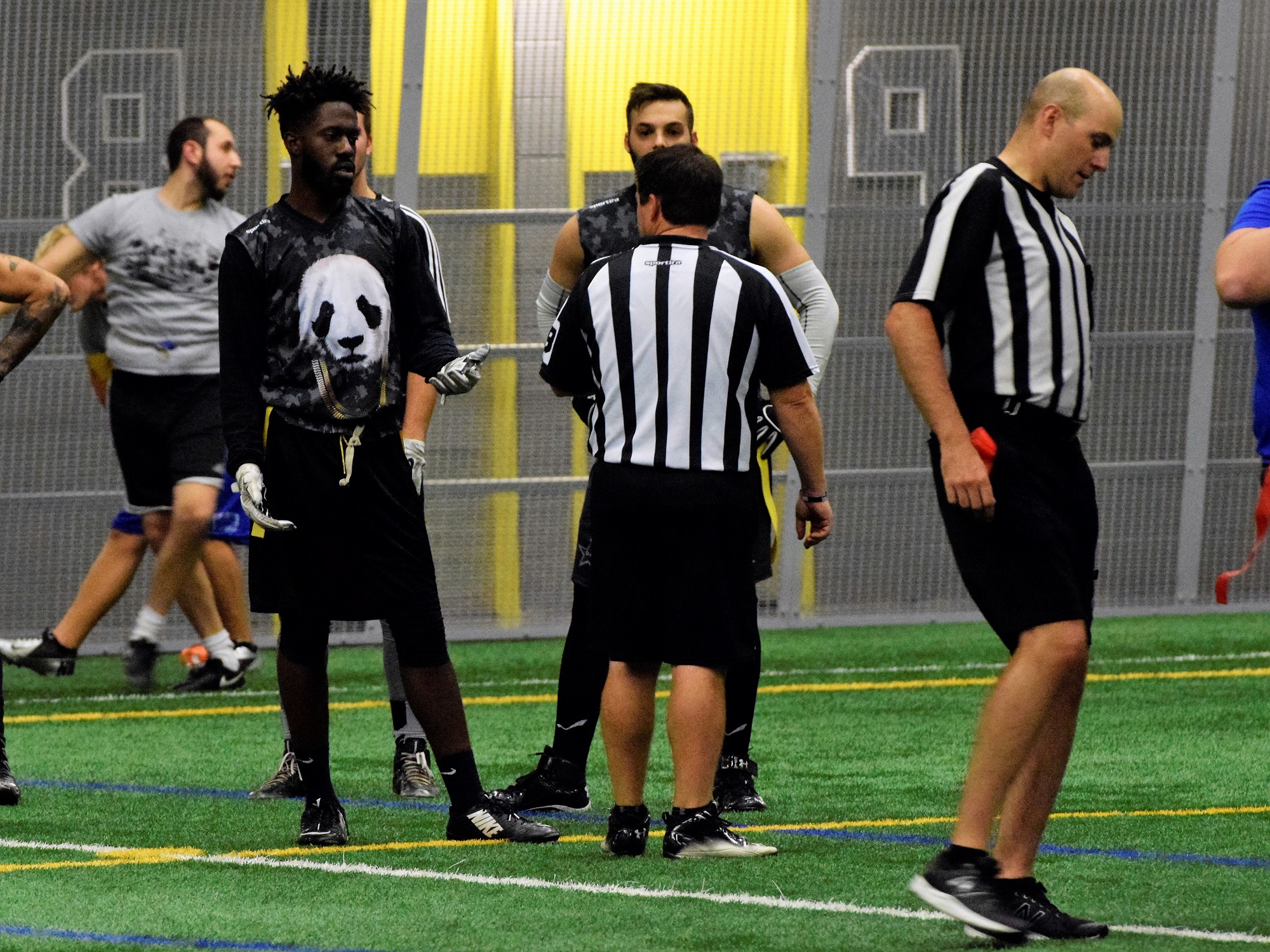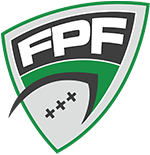Behind Enemy Lines: Holding, Jumping, OCs

Now that we are getting down to the last few weeks, we’d like to address some final concerns that players frequently raise in the way of 3 penalties: holding, jumping and a little soap box segment on objectionable conduct. Hopefully this will give some insights into why certain penalties are called, or more importantly why they are not called in certain situations.
Let us begin with holding. Very loosely stated, holding is grabbing onto an opponent which restricts the offensive player’s ability to advance the ball. Now there are a few things to consider here. First, if a defender grabs shorts, jersey, or both at the same time that a flag is pulled, there is no penalty for holding. Why? Quite simply because that action could not have restricted the ball carrier’s ability to advance the ball as it coincides with the loss of flags and thus the end of the play. While ripped shirts and shorts are unfortunate for all, it is a risk of playing flag football so don’t wear your Sunday bests to play and always carry an extra pair of shorts (without pockets, of course).
What we look for is a tug on clothing that would prevent the runner from gaining additional yards. If we see an accidental tug on the shirt and it is immediately let go which doesn’t have a material impact on the progress of the runner, there is no penalty on the play. Defenders will miss flags, that is what makes this sport so fun (and frustrating). There is a little leeway in the miss, if the clothing is let go immediately. The easy ones are where a defender is practicing their water skiing technique for the summer or the famous two-handed tackle where the first arm pulls the shirt so the runner can’t get away and the second hand completes the tackle. Where there is a little bit of grey, we default to was the runner’s advancement materially impacted by the defender.
Another holding call that can be called is the arm wrap. Defenders seem to like breaking down, bodies positioned in front of an oncoming ball carrier, arms stretched out waiting to pounce like a black widow on its prey. This is illegal. Unfortunately you cannot wrap your two arms around a defender in order to slow their progress while you complete the tackle. If the flag comes off immediately you may not be penalized but get a stern warning from the official, but this tackling technique will more often than not get your team a 5-yard add-on penalty.
On to a penalty that gets a lot of attention at the rules committee meeting every year: Jumping. Let me start by saying that it is NOT illegal to simply jump in FPF, provided that it is not done in one of the following scenarios. Perhaps the penalty being called “jumping” presents some confusion because it is often taken very literally by players and perhaps officials on occasion, and understandably so! If you have any recommendations on more appropriate nomenclature, you know how to reach us.
So what is the “jumping” rule then? Well, quite simply, players cannot do any of these things:
- Cannot attempt to hurdle an opponent to gain yards
- Cannot attempt to dive for extra yards, or for the goal line for example
- Cannot be running in an out-of-control manner and jump to change momentum in a dangerous fashion
- Players cannot intentionally jump in the air to avoid being de-flagged, though jumping as part of a juke is legal
Note: Any player who jumps in an illegal manner and makes contact with a defender can be called for unnecessary roughness in addition to the minor penalty for jumping. In addition, a diving player can be penalized for unnecessary roughness even if there is no contact with the defender because of the sheer danger of these types of plays.
What players are allowed to do is jump if it is part of a juke, and there really isn’t any other standard to consider. We have heard “ref, both feet came off the ground” or “he got a foot off of the ground during the juke”…in either case it may be true, but still no penalty is warranted. If at any time a player is making a juke, changing directions and being creative athletically, we will not penalize the offensive player. Players must be in control of their bodies, cannot use a juke as a reason for hitting a defensive player, and must not flag guard as part of the play.
Note: At any time, if a player makes a dangerous play with their bodies, they can be penalized for unnecessary roughness.
So now that we have covered off the standards for two possession fouls, we are sure you’re asking “that this is all great, but how do all the FPF refs know what we are writing?!” Great question (even though we sort of asked ourselves)! All officials have access to a “standards and interpretations” document which outlines what constitutes a penalty and goes into more detail on when a standard for a penalty is met or not met with real scenarios and play examples. Some penalties even have pictures and diagrams. It builds on what is in the rulebook which is a black and white representation of a rule, and makes it more functional by applying general practicality to it. At the end of this article we’ll paste in the standards for holding as a reference.
One of the more subjective penalties an official will call is Objectionable Conduct, the Canadian version of Unsportsmanlike Conduct. It is a true statement that each official has a different threshold for what constitutes a penalty versus what would deserve a warning versus what doesn’t get called. I mean, there are some easy ones, like if you score a touchdown and act like you have never scored before and spike the ball in your opponent’s face, then 100% of FPF officials will call it. But there are things that are a little greyer…there are outside factors like how the game is going and what the particular action has caused, and frequency of the comments (if a player complains every play, what they say specifically matters much less, there is definitely an accumulation affect which will still warrant an O.C.) which can be considered in the calling of a penalty. And believe it or not, WE ARE ALL HUMAN BEINGS under the stripes, so individual judgment, emotions and feelings also explain differences in how we apply this rule.
FPF is a recreational league, and we’ll once again reiterate that we are humans under the stripes. We have jobs, and families, and generally love football and officiating. Additionally, when we sign up for this job, we enlist in always having to be the bigger people – we can’t talk back to players, we have to absorb your comments with an aura of professionalism and maturity that we wish we could impart on some of our players. Can you imagine what it would be like if officials spoke to players in the same manner that the players speak to officials?? It would be the wild west and while we laugh at the thought of that happening (or an official celebrating and talking sh*t after making a great call – or waving their arms like DBs do after breaking up a pass yelling “oh nah, not today…don’t test me like that today, I’m all over that today”) just think about how inappropriate that would be – it is the same level of inappropriateness of being subjected to the abuse that we get while officiating.
Let us say this: it is never acceptable to verbally abuse an official in FPF or any other league. There is no call, made or missed, that should warrant a player swearing, yelling, or demeaning an official’s judgement, personality or ability to do their job.
Know that it is ok to be upset, know that it is ok to question a play, and know that it is ok to express your displeasure. But also know that you can do so, even when emotions are at an all-time high during a sport filled with testosterone, in a respectful manner without the use of swear words and maintaining a minimum level of respect for the men and women who give up their evenings for your game. In some ways, FPF needs a bit of a makeover, and that is through the institution of zero-tolerance policy that the senior officials and rules committee are pushing to institute.
The truth is that we as officials do not want to give O.C. penalties because we do not enjoy sending players off, but it has come to a point where some players leave us with little choice. We need to ensure that the enjoyment of the league for all participants, players, officials, scorekeepers and fans alike is maintained and as soon as it isn’t, a penalty will be called. Please encourage your teams to speak to opponents and officials with respect, without swearing, and within the spirit of sportsmanship. We do not want have to do so, but please be cognizant that if it doesn’t get better soon, there will have to be a change.
Thanks, as always, for reading. We hope you took something away in terms of holding and jumping, and thanks for listening to us about abuse of officials and opponents.
Extract from the FPF Standards and Interpretations document
© FlagPlus Football 2017
Holding
Holding is a penalty when a defender grabs onto a ball carrier’s clothing or encircles the ball carrier during an attempted de-flag which restricts the ball carrier’s ability to advance the football.
Not a penalty:
- A slight grab which does not restrict the ball carrier’s ability of advancing the ball
- A grab of the clothing simultaneously as the de-flag occurs
- A grab which is immediately released
Penalty:
- A lengthy grab of the clothing
- A grab which restricts the ball carrier’s ability to advance the ball
- A grab with one hand and a de-flag with the other is an automatic foul
- Encircling a ball carrier with arms not allowing the ball carrier room to advance without initiating contact with the defender


